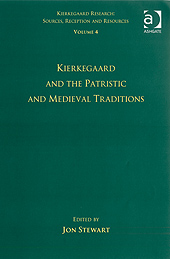
Kierkegaard Research: Sources,
Reception and Resources
|
||


 |
||
|
This volume features articles which
employ source-work research to trace Kierkegaard’s understanding and use of
authors from the Patristic and Medieval traditions. It covers an
extraordinarily long period of time from Cyprian and Tertullian in the
second century to Thomas à Kempis in the fifteenth. Despite its
heterogeneity and diversity in many aspects, this volume has a clear point
of commonality in all its featured sources: Christianity. Kierkegaard’s relation to the Patristic and Medieval traditions has been a rather neglected area of research in Kierkegaard studies. This is somewhat surprising given the fact that the young Kierkegaard learned about the Patristic authors during his studies at the University of Copenhagen and was clearly fascinated by many aspects of their writings and the conceptions of Christian religiosity found there.
With regard to the medieval tradition, in addition to numerous theological issues, there were many other themes that exercised Kierkegaard during different periods of his life: medieval mysticism, medieval art, the medieval church, troubadour poetry and the monastic movement.
Although far from uncritical, he seems at times to idolize both the Patristic tradition and the Middle Ages as contrastive terms to the corrupt and decadent modern world with its complacent Christianity. While he clearly regards the specific forms of this Medieval appropriation of Christianity to be misguided, he is nonetheless positively disposed toward the general understanding of it as something to be lived and realized by each individual.
Table of
Contents Part I: The Patristic Tradition
Augustine:
Kierkegaard’s Tempered Admiration of Augustine
Bernard of
Clairvaux: Kierkegaard’s Reception of the Last
Chrysostom:
Between the Hermitage and the City
Cyprian of
Carthage: Kierkegaard, Cyprian, and the “urgent needs of the
times”
Gregory of Nyssa:
Locating the Cappadocian Fathers in Kierkegaard’s
Church-Historical Narrative
Irenaeus: On
Law, Gospel and the Grace of Death
Origen:
Kierkegaard’s Equivocal Appropriation of Origen of Alexandria
Pelagius:
Kierkegaard’s Use of Pelagius and Pelagianism
Tertullian:
The Teacher of the
credo quia absurdum
Part II: The Medieval Tradition
Dante: Tours
of Hell: Mapping the Landscape of Sin and Despair
|
Kierkegaard and the Bible,
Kierkegaard and the
Kierkegaard and the
Patristic and Medieval Traditions
Kierkegaard and his
Kierkegaard and his
|
|
The
series Kierkegaard Research: Sources,
Reception and Resources is published Routledge Research, Philosophy
Routledge / Taylor & Francis Group, 711 Third Ave., Eighth Floor, New York, NY 10017, USA
|
||








